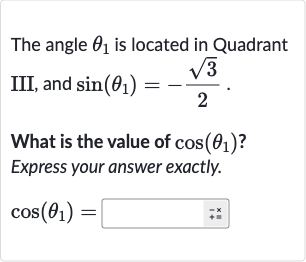Full solution
Q. The angle is located in Quadrant III, and .What is the value of ? Express your answer exactly.
- Step : Find : We know that . Use the Pythagorean identity to find the value of .Substitute for in ..
- Step : Substitute in the Pythagorean identity: Simplify to find the value of .
- Step : Simplify the equation: Since , we take the square root of both sides to find .
- Step : Find the value of : Determine the sign of based on the quadrant in which is located.Since is in Quadrant III, both sine and cosine are negative.Therefore, is negative.

